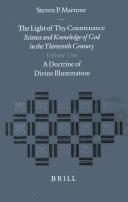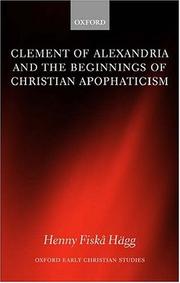
ISBN: 2204017809 9782204017800 Year: 1983 Publisher: Paris Les Éditions du Cerf
Abstract | Keywords | Export | Availability | Bookmark
 Loading...
Loading...Choose an application
- Reference Manager
- EndNote
- RefWorks (Direct export to RefWorks)
#GROL:MEDO-230.11 --- Atheism --- Faith --- God (Christianity) --- Prayer --- Religion --- #GGSB: Dogmatiek --- #GGSB: Godsleer --- 231.133.11 --- 231.133.11 Kenbaarheid van God --- Kenbaarheid van God --- Religion, Primitive --- God --- Irreligion --- Religions --- Theology --- Christianity --- Trinity --- Religious belief --- Theological belief --- Belief and doubt --- Salvation --- Theological virtues --- Trust in God --- Philosophy --- Agnosticism --- Free thought --- Secularism --- Theism --- Dogmatiek --- Godsleer --- Prayer - Christianity
Book
ISBN: 9789042936478 9042936479 9789042936973 Year: 2018 Volume: 300/A-B Publisher: Leuven Peeters
Abstract | Keywords | Export | Availability | Bookmark
 Loading...
Loading...Choose an application
- Reference Manager
- EndNote
- RefWorks (Direct export to RefWorks)
Parler de Dieu est aussi perilleux que necessaire. Aujourd'hui, pas plus qu'autrefois, il ne convient pas, en cette matiere cruciale entre toutes, de se contenter d'un simple mutisme. Mais de Dieu, on ne saurait poser une connaissance par l'homme sans qu'il faille alors poser une inconnaissance plus grande encore. La connaissance de Dieu, en derniere instance, est evenement eschatologique, qui dans l'histoire ne peut que s'anticiper. Le parcours ici propose comprend pas moins de dix-huit chapitres. Pour en avoir une synopse plus aisee, il convient de les regrouper, comme l'indique la Conclusion de l'ouvrage, en sept ensembles. Un premier ensemble (chapitres I et II) traite de l'acces a Dieu d'abord par le chemin de la religion (chap. I), puis par celui de la theologie naturelle (chap. II). Un deuxieme ensemble (embrassant les chapitres III a V) presente les preuves de Dieu (chap. III), leur critique par Kant (chap. IV), et le depassement hegelien de la critique kantienne (un depassement pretant lui-meme le flanc a la critique, chap. V). Dans un troisieme ensemble (incluant les chapitres VI et VII), les monotheismes (chap. VI) contrastent avec les atheismes (chap. VII). Un quatrieme ensemble (chapitres VIII et IX) considere le langage religieux (chap. VIII), la doctrine de l'analogie et la theologie negative (chap. IX). Un cinquieme ensemble (chapitres X a XIII) a trait a l'experience chretienne (chap. X), la mystique (chap. XI), l'inconnaissance de Dieu selon Eckhart (chap. XII), et la question de Dieu chez Heidegger (chap. XIII). Un sixieme ensemble (chapitres XIV et XV) aborde les deux themes principaux de la theologie fondamentale (saisie en tant que partie de la theologie) : la revelation (chap. XIV) et la foi (chap. XV). Un septieme et dernier ensemble (chapitres XVI a XVIII) s'interroge sur l'essence et les attributs de Dieu (chap. XVI), le rapport entre le Dieu impassible et la mort (chap. XVII), et la vision du Dieu invisible dont jouissent les bienheureux apres la mort (chap. XVIII). On peut distribuer ces sept ensembles en trois parties principales : on passe de la thematique des diverses religions et de la raison " naturelle " (premier et deuxieme ensembles) au differend entre monotheisme, notamment chretien, et differentes formes d'atheisme, voire de mysticisme purement naturaliste (troisieme, quatrieme et cinquieme ensembles) ; et on se centre, pour finir, sur la foi catholique dans la revelation du Dieu trinitaire librement engage dans la kenose redemptrice, et sur l'esperance de la " vision " (sixieme et septieme ensembles).
Doctrine of God (christianism) --- God --- Philosophical theology --- Negative theology --- 231.133.11 --- GBIB: jesuitica --- 231.133.11 Kenbaarheid van God --- Kenbaarheid van God --- Theology, Philosophical --- Philosophy and religion --- Theology, Doctrinal --- Metaphysics --- Misotheism --- Monotheism --- Religion --- Theism --- History of doctrines --- Knowableness&delete& --- Proof --- Proof&delete& --- Knowableness
Book
ISBN: 9043504394 Year: 2002 Publisher: Kampen Kok
Abstract | Keywords | Export | Availability | Bookmark
 Loading...
Loading...Choose an application
- Reference Manager
- EndNote
- RefWorks (Direct export to RefWorks)
God (Christianity) --- 231.133.11 --- 231.133.11 Kenbaarheid van God --- Kenbaarheid van God --- Christianity --- Trinity --- Knowableness&delete& --- History of doctrines --- Barth, Karl, --- Calvin, Jean --- Calvijn, Johannes --- Calvinus, Johannes --- Parŭtʻŭ, Kʻal, --- Barth, Karol, --- Barŭtʻŭ, Kʻal, --- Barŭtʻŭ, --- Bate, --- בארת, קרל, --- カール·バルト, --- 巴特, --- Doctrine of God (christianism) --- Barth, Karl --- Calvin, John --- Knowableness
Book
ISBN: 9783451023200 3451023202 9783451833205 3451833204 Year: 2022 Publisher: Freiburg im Breisgau Verlag Herder
Abstract | Keywords | Export | Availability | Bookmark
 Loading...
Loading...Choose an application
- Reference Manager
- EndNote
- RefWorks (Direct export to RefWorks)
"Ist eine Gotteserkenntnis unabhängig vom Glauben möglich? Setzt der Glaube, wenn er sich weiterhin als fides quaerens intellectum versteht, nicht ein Wissen von Gott voraus, das vielen heute kaum noch erreichbar erscheint? Muss dann aber nicht das Konzept ad acta gelegt werden? Was vermag ein Rückbezug auf die philosophische und theologische Tradition noch zu leisten? Kann etwa den traditionellen Gottesbeweisen noch Relevanz zuerkannt werden? Die Beiträge bieten einen Überblick über ganz unterschiedliche Ansätze der gegenwärtigen Theologie und Religionsphilosophie und befördern so die Diskussion."
God (Christianity) --- God --- Faith --- 231.133.11 --- 231.12 --- Knowableness of God --- Knowledge of God (Knowableness of God) --- 231.12 Wezen van God --- Wezen van God --- 231.133.11 Kenbaarheid van God --- Kenbaarheid van God --- Religious belief --- Theological belief --- Belief and doubt --- Religion --- Salvation --- Theological virtues --- Trust in God --- Knowableness --- Proof --- Knowledge (Knowableness)
Book
ISBN: 9004119477 Year: 2001 Publisher: Leiden Brill
Abstract | Keywords | Export | Availability | Bookmark
 Loading...
Loading...Choose an application
- Reference Manager
- EndNote
- RefWorks (Direct export to RefWorks)
Knowledge [Theory of ] (Religion) --- History --- God --- Knowableness --- History of doctrines --- Religion and science --- Thirteenth century --- God (Christianity) --- Knowledge, Theory of (Religion) --- 231.133.11 --- 231.133.11 Kenbaarheid van God --- Kenbaarheid van God --- Epistemology, Religious --- Religious epistemology --- Religious knowledge, Theory of --- Religion --- Theology, Doctrinal --- History of controversy --- Philosophy
Book
ISBN: 9041403450 Year: 2003 Publisher: Amsterdam Anthos
Abstract | Keywords | Export | Availability | Bookmark
 Loading...
Loading...Choose an application
- Reference Manager
- EndNote
- RefWorks (Direct export to RefWorks)
God (Christianity) --- Hidden God --- #gsdb3 --- 231.133.11 --- 291.2 --- 231.133.11 Kenbaarheid van God --- Kenbaarheid van God --- Deus Absconditus --- God --- God, Hidden --- Silence of God --- Christianity --- Trinity --- 291.2 Godsdienstleer. Dogma's. Religieuze doctrines --- Godsdienstleer. Dogma's. Religieuze doctrines --- Absence --- Silence --- Knowableness --- 231 --- 231 God. De Deo uno et trino:--dogmatisch --- God. De Deo uno et trino:--dogmatisch --- Religious studies --- Doctrine of God (christianism)
Book
ISBN: 9780268022426 0268022429 Year: 2015 Publisher: Notre Dame, Indiana University of Notre Dame Press
Abstract | Keywords | Export | Availability | Bookmark
 Loading...
Loading...Choose an application
- Reference Manager
- EndNote
- RefWorks (Direct export to RefWorks)
In the face of religious and cultural diversity, some doubt whether Christian faith remains possible today. Critics claim that religion is irrational and violent, and the loudest defenders of Christianity are equally strident. In response, Desire, Faith, and the Darkness of God: Essays in Honor of Denys Turner explores the uncertainty essential to Christian commitment; it suggests that faith is moved by a desire for that which cannot be known. This approach is inspired by the tradition of Christian apophatic theology, which argues that language cannot capture divine transcendence. From this perspective, contemporary debates over God’s existence represent a dead end: if God is not simply another object in the world, then faith begins not in abstract certainty but in a love that exceeds the limits of knowledge. The essays engage classic Christian thought alongside literary and philosophical sources ranging from Pseudo-Dionysius and Dante to Karl Marx and Jacques Derrida. Building on the work of Denys Turner, they indicate that the boundary between atheism and Christian thought is productively blurry. Instead of settling the stale dispute over whether religion is rationally justified, their work suggests instead that Christian life is an ethical and political practice impassioned by a God who transcends understanding. (Publisher).
Theology --- 231.133.11 --- 215.2 --- 23 <082> --- 215.2 Geloven en weten --- Geloven en weten --- 231.133.11 Kenbaarheid van God --- Kenbaarheid van God --- Christian theology --- Theology, Christian --- Christianity --- Religion --- 23 <082> Dogmatiek. Systematische theologie. Theologie:--in strikte zin--Feestbundels. Festschriften --- 23 <082> Theologie dogmatique. Theologie systematique. Theologie dans le sens stricte--Feestbundels. Festschriften --- Dogmatiek. Systematische theologie. Theologie:--in strikte zin--Feestbundels. Festschriften --- Theologie dogmatique. Theologie systematique. Theologie dans le sens stricte--Feestbundels. Festschriften --- Festschrift - Libri Amicorum --- Religious studies --- Christian spirituality
Book
ISBN: 9789490708313 9789004203907 9490708313 Year: 2012 Publisher: Vught Skandalon
Abstract | Keywords | Export | Availability | Bookmark
 Loading...
Loading...Choose an application
- Reference Manager
- EndNote
- RefWorks (Direct export to RefWorks)
Analyse van de Bijbel en de cultuur van het oude Nabije Oosten in verband met de problematiek rond de communicatie tussen goden/God en de mensen
Natural theology --- Christian dogmatics --- God --- Hidden God --- Belief and doubt --- 231.13 --- 231.133.11 --- 21*015 --- 21*015 Theologie en taal --- Theologie en taal --- 231.133.11 Kenbaarheid van God --- Kenbaarheid van God --- 231.13 Eigenschappen van God --- Eigenschappen van God --- God (Christianity) --- God (Judaism) --- Conviction --- Doubt --- Consciousness --- Credulity --- Emotions --- Knowledge, Theory of --- Philosophy --- Psychology --- Religion --- Will --- Agnosticism --- Rationalism --- Skepticism --- Deus Absconditus --- God, Hidden --- Silence of God --- Metaphysics --- Misotheism --- Theism --- Biblical teaching --- Absence --- Silence --- Knowableness

ISSN: 00818607 ISBN: 9004120645 9004119477 9004120653 9786610464517 1417536632 1280464518 9047400666 9781417536634 9789047400660 9789004119475 9789004120648 9789004120655 Year: 2001 Volume: 98 Publisher: Leiden Boston Brill
Abstract | Keywords | Export | Availability | Bookmark
 Loading...
Loading...Choose an application
- Reference Manager
- EndNote
- RefWorks (Direct export to RefWorks)
This work documents the development of scholastic argumentation in 13th century Europe. It traces the rise of a formal model of science and resulting accommodations in traditional attitudes towards human cognition, especially with regard to the role of divine illumination.
God (Christianity) --- Knowledge, Theory of (Religion) --- Religion and science --- Knowableness --- History of doctrines. --- History. --- Thirteenth century. --- Dertiende eeuw --- Thirteenth century --- Treizième siècle --- 231.133.11 --- -Religion and science --- -Thirteenth century --- God --- -13th century --- Middle Ages --- 231.133.11 Kenbaarheid van God --- Kenbaarheid van God --- Christianity and science --- Geology --- Geology and religion --- Science --- Science and religion --- Religious knowledge, Theory of --- Religion --- Theology, Doctrinal --- Metaphysics --- Misotheism --- Monotheism --- Theism --- History --- -History of Doctrines --- Religious aspects --- Philosophy --- Epistemology, Religious --- Religious epistemology --- Christianity --- Trinity --- Knowableness&delete& --- History of doctrines --- History of controversy --- 13th century --- God (Christianity) - Knowableness - History of doctrines. --- Knowledge, Theory of (Religion) - History. --- Religion and science - History.

ISBN: 9780199288083 0199288089 019160416X 1281154598 9786611154592 1435624165 0191537101 Year: 2006 Publisher: Oxford Oxford university press
Abstract | Keywords | Export | Availability | Bookmark
 Loading...
Loading...Choose an application
- Reference Manager
- EndNote
- RefWorks (Direct export to RefWorks)
Can humans know God? Can created beings approach the Uncreated? The concept of God and questions about our ability to know him are central to this book. Eastern Orthodox theology distinguishes between knowing God as he is (his divine essence) and as he presents himself (through his energies), and thus it both negates and affirms the basic question: man cannot know God in his essence, but may know him through his energies. Henny Fiska Hagg investigates this earliest stage of Christian negative (apophatic) theology, as well as the beginnings of the distinction between essence and energies, focusing on Clement of Alexandria in the late second century. Clement's theological, social, religious, and philosophical milieu is also considered, as is his indebtedness to Middle Platonism and its concept of God.
Negative theology --- Théologie négative --- Christianity --- History of doctrines. --- Christianisme --- Histoire des doctrines --- Clement, --- Theologie negative --- -276 =75 CLEMENS ALEXANDRINUS --- 231.133.11 --- Apophatic theology --- Via negativa (Theology) --- Theology --- Mysticism --- -History of doctrines. --- Griekse patrologie--CLEMENS ALEXANDRINUS --- Kenbaarheid van God --- Clemens, --- Clemens, Titus Flavius, --- Clément, --- Clemente, --- Klemens, --- Klēmens, --- Kliment, --- Titus Flavius Clemens, --- إكليمنضس السكندري --- 231.133.11 Kenbaarheid van God --- Théologie négative --- Christianity. --- 276 =75 CLEMENS ALEXANDRINUS --- Christianity&delete& --- History of doctrines --- Klēmēs, --- Negative theology - Christianity - History of doctrines. --- Theologie negative - Christianisme - Histoire des doctrines --- Clement, - of Alexandria, Saint, - ca. 150-ca. 215.

 Search
Search Feedback
Feedback About UniCat
About UniCat  Help
Help News
News